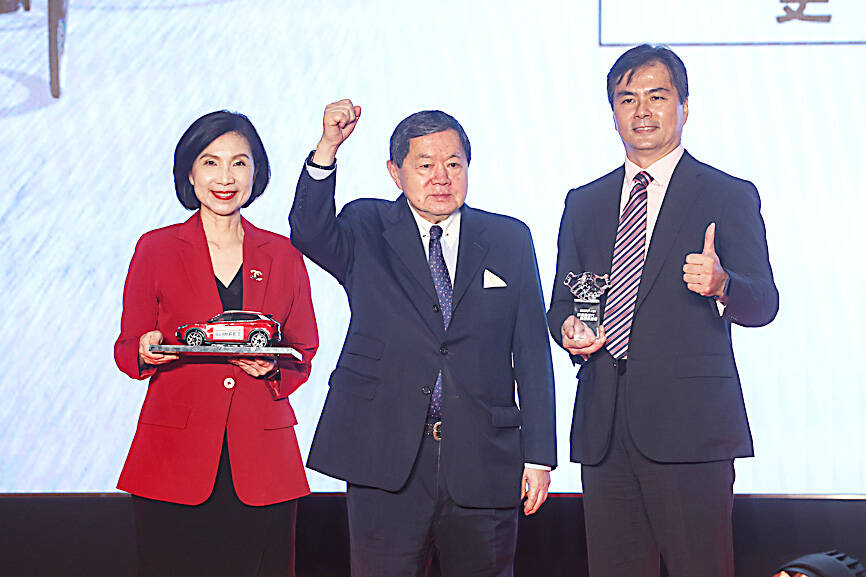Far EasTone Telecommunications Co (遠傳電信) yesterday said it aims to expand its number of mobile subscribers to about 10 million, or about one-third of the market, as part of its strategy in a new competitive landscape following market consolidation.
Far EasTone made the remarks after last month receiving conditional approval from the Fair Trade Commission to acquire Asia Pacific Telecom Co (亞太電信), clearing the final hurdle to proceed with the deal. The transaction is to take effect next quarter.
“The number of telecoms will shrink following the merger of Far EasTone and Asia Pacific, but the market competition will intensify,” Far EasTone chairman Douglas Hsu (徐旭東) told reporters.

Photo: CNA
Far EasTone would be competing head-to-head with its rivals, which have almost identical subscriber bases, following the acquisition of Asia Pacific, company president Chee Ching (井琪) said.
The new entity would have a combined 9.2 million mobile subscribers, lagging behind Chunghwa Telecom Co’s (中華電信) 11.15 million, but ahead of an estimated 9.8 million for Taiwan Mobile Co (台灣大哥大) after it acquires Taiwan Star Telecom Corp (台灣之星).
The nation’s competition watchdog is widely expected to give the go-ahead later this month at the earliest to Taiwan Mobile’s bid to absorb Taiwan Star after wrapping up a 30-day review.
As a result, the number of telecoms in Taiwan would shrink to three from five.
Far EasTone said that more than 36 percent, or about 2 million, of its post-paid subscribers, not including Asia Pacific’s, are 5G users.
To woo more mobile subscribers from rivals, Far EasTone yesterday rolled out new service plans with affordable monthly rates from NT$149 to NT$399 (US$4.66 to US$12.48) and heavy subsidies for smartphones and home appliances.
The new service plans target 4G users and their potential to upgrade to 5G service.
One of its promotions for new 5G service subscribers is a free Samsung smartphone and a rice cooker for a minimum 12-month subscription plan at NT$599 per month plus a NT$1 fee.
Far EasTone expects to complete the network integration with Asia Pacific within one month after it takes effect.
The company would operate 12,500 base stations nationwide as a result of infrastructure optimization, it estimated.
The telecom said it does not expect the merger to incur significant increases in capital spending due to base station additions.
It has budgeted NT$9 billion for this year’s capital expenditure, down from an outlay of NT$9.9 billion last year.
Far EasTone expects the merger to significantly increase its spectrum resource, especially in the low-band bandwidth, or lower-than 1-gigahertz band, which is considered the most efficient band.
Far EasTone would operate 50 megahertz of bandwidth, up 66 percent.
The company’s 5G bandwidth would also rise 50 percent to 120 megahertz.

NEW IDENTITY: Known for its software, India has expanded into hardware, with its semiconductor industry growing from US$38bn in 2023 to US$45bn to US$50bn India on Saturday inaugurated its first semiconductor assembly and test facility, a milestone in the government’s push to reduce dependence on foreign chipmakers and stake a claim in a sector dominated by China. Indian Prime Minister Narendra Modi opened US firm Micron Technology Inc’s semiconductor assembly, test and packaging unit in his home state of Gujarat, hailing the “dawn of a new era” for India’s technology ambitions. “When young Indians look back in the future, they will see this decade as the turning point in our tech future,” Modi told the event, which was broadcast on his YouTube channel. The plant would convert

‘SEISMIC SHIFT’: The researcher forecast there would be about 1.1 billion mobile shipments this year, down from 1.26 billion the prior year and erasing years of gains The global smartphone market is expected to contract 12.9 percent this year due to the unprecedented memorychip shortage, marking “a crisis like no other,” researcher International Data Corp (IDC) said. The new forecast, a dramatic revision down from earlier estimates, gives the latest accounting of the ongoing memory crunch that is affecting every corner of the electronics industry. The demand for advanced memory to power artificial intelligence (AI) tasks has drained global supply until well into next year and jeopardizes the business model of many smartphone makers. IDC forecast about 1.1 billion mobile shipments this year, down from 1.26 billion the prior

People stand in a Pokemon store in Tokyo on Thursday. One of the world highest-grossing franchises is celebrated its 30th anniversary yesterday.

Zimbabwe’s ban on raw lithium exports is forcing Chinese miners to rethink their strategy, speeding up plans to process the metal locally instead of shipping it to China’s vast rechargeable battery industry. The country is Africa’s largest lithium producer and has one of the world’s largest reserves, according to the US Geological Survey (USGS). Zimbabwe already banned the export of lithium ore in 2022 and last year announced it would halt exports of lithium concentrates from January next year. However, on Wednesday it imposed the ban with immediate effect, leaving unclear what the lithium mining sector would do in the